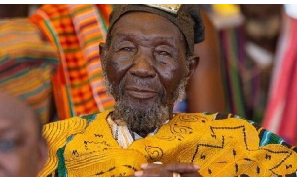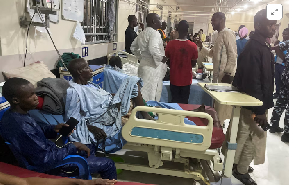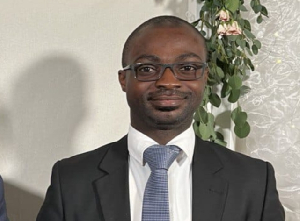(Sagito Musah Issakah)
To claim to be independent is no joke; to be independent requires the bracing of oneself for an enormous responsibility that requires the support of thousands and millions of hands; to be able to get the support of other hands however would depend largely on how your design and mechanism developed to tackle the responsibilities are clear and workable.
Ghana as a nation-state has lorded itself and boasted of being the first country south of the Sahara to have broken itself off the shackles of colonialism and therefore became an independent state controlled by its own. In fact one of the widely known statements of a leader of the fight for Ghana’s independence, who became the first president of the state after independence, Osagyefo Dr. Kwame Nkrumah, is that ‘…the black man was capable of managing its own affairs…’ To prove to the world the achievability of this statement, the great Osagyefo instituted mechanisms, policies, programmes and projects that could give meaning to the independence of Ghana holistically (not only political). Factories/industries where put in place to process raw materials for export, schools were established to train the people for a prosperous future all over the country, health care facilities were established, road networks were constructed to link farms to industries and also create access to other social services, etc.
The Osagyefo instituted all these projects and programmes backed by a vision. A vision that would enable Ghana to rock shoulders with the developed nations in some decades to come. The vision unfortunately was truncated somewhere in the history of the nation by the Military, backed by some civilians who claimed to be uninterested in the policies of the Osagyefo then.
The nation has come a long way since independence and there is nothing developmentally and significantly positive to show except for the fact that we are living and still recognized by the international community as an independent state (albeit politically). The vision of Dr. Nkrumah and all the programmes and projects he instituted to realize the vision were all thrown to the gutters by the successive governments (military and constitutional) that succeeded him.
Sometimes, in my quite moments, the questions that constantly occupy my mind are: How would Ghana look like today if the good Lord had not blessed us with the invaluable resources that spread all over the country? Is it that the good Lord blessed us with material resources alone and deprived us of the human resources (great leaders) to transform these resources for the betterment of the citizenry? Or is it that the right leaders are there but are refusing to avail themselves for leadership positions because the kind of governance system we are operating gives room for only people with questionable and morally weak characters to assume leadership positions. These legitimate questions that occupy my mind (and I strongly believe occupy the minds of so many other loyal Ghanaians) are borne out of the fact that countries that we started with during the 1950s and 60s have transformed to near-developed states leaving us miles behind. We are still grappling with some conditions of the 1950s even in today’s 21st century.
With all the resources spread all over the country, the state still finds it difficult raising domestic funds for development projects and programmes. All we know how to do is roam all over the world with calabash in hand begging for financial assistance to undertake development projects. We sometimes even borrow money from the international community to service other loan facilities. How should that be possible?
In the face of all these borrowing, the state officials (political and bureaucrats) still takes pride in wantonly dissipating the little funds that the country raises for development as a result of bad management. The irony is that these are the same people who seize the slightest opportunity to trumpet loyalty and branding other people as unpatriotic. These people are rather in actual fact milking the state to dryness and facilitating underdevelopment.
The waste in the system is too much and instead of government finding a way to stop it thereby saving the state huge sums of money, it has rather adopted what most people view as the defeatist approach to raising domestic funds by taxing the people in all conceivable areas. The phenomenon of wasting of national resources is not peculiar to one government. It has existed in almost all governments since independence and even in today’s Ghana.
There are some covert and overt actions championed by government and its institutions that need to stop to save the state huge sums of money that can be used for development projects and programmes. These are actions that do nothing but facilitate wastage and enrich few disloyal Ghanaians at the expense of the interest of the masses. The situation has persisted for a long time and needs to stop. To be able to stop it would require the strong will on the part of the government. Few of these actions that facilitate resource wastage are as below:
MINISTERS AND THEIR SALARIES
I have often asked this question and any time I asked I don’t seem to get an answer. The question is ‘what at all is the Minister of State doing to deserve the huge monthly salary that they receive?’ I don’t know what the Chinery-Hesse Committee considered as the work of the Minister before concluding on the huge amount that Ministers are being paid today as monthly salary. The truth is that except for the fact that the Ministers term of employment is not definite or determined, the Minister of State and his/her deputy(ies) in our part of the world does not do enough to merit the salary they take. Every single work of the Minister is done by the Civil Servant or the Local Government Servant. The only work the minister and their deputies do in the office is to sign documents and attend functions to read speeches prepared by the bureaucrats. The irony of the situation is that the Ministers and their Deputies receives salaries in the range of 8,000 to 10,000 a month for doing less of the job at the ministries and the Civil and Local Government Servants who do almost all the work at the Ministries receives salaries in the range of 500 to 2,500 Ghana cedis. This is Ghana for you.
My mathematics is poor but let do a simple calculation here. Currently the state is governed by over 100 Minister, Deputies and Special Aides and Board members (whose monthly salaries are almost the same as the deputies). Let us strike an average salary of say 9,000 and multiply this amount with roughly 100 Minister, Deputies and Special Aides and Board members. We get 900,000 as monthly salary for our minister et al. When we multiply the 900,000 by 12 months, we get 10,800,000 as the yearly amount the state spends on political office holders who are doing nothing significant in terms of work in the Ministries. This figure may be more than this if we do serious mathematics with the actual number of officers, which I believe is more than the 100 I used for the simple calculation. The salary figure may also be more than what I use for the calculation and that is minus the undeserved allowances they receive alongside the salaries.
Now, how can the government save money from this situation? To be able to do this the state would have to adopt a policy of Voluntarism for the position of Ministers, deputies, special Aides and Board members. Ghana is blessed with intelligent, already established Ghanaian professionals in various fields of endeavour who would want to contribute to the development of the nation without necessarily demanding the huge monthly salary. As a way of motivation the state can decide to peg their salary to that of a Director or Chief Director in the Ministry which hovers around 2,000 to 3,000 ghana cedis. Imagine how much the state would be saving if this proposal is implemented. This is aside the fact that these professionals would give their all for the development of the state because their minds would not be occupied by how to narrowly serve the interest of political party faithful at the expense of the whole nation. This would however mean that we abandoned that policy of “Job for the Boys and Party contributors).
FREE VEHICLES FOR FORMER MINISTERS
The country is considered by our politicians as challenged and yet these same politicians, across all political divide, adopt ostentatious lifestyles at the expense of the nation when they assume political authority. There seem to be an undocumented policy implemented by the state (and on only politicians) which allows the government of the day to buy saloon cars with state funds for some political office holders (ministers and their deputies) to send home for free after their tenure of office.
Simple mathematics: Let’s say these new saloon cars costs 60,000 for one and about 50 ministers and their deputies are to be given one saloon car each after their tenure of office. So 60,000 multiply by 50, we get 3,000,000. This millions could have been used to construct classroom blocks or health centres in some rural communities in the country. This would be more honourable and morally right than buying saloon cars for individuals at the expense of the interest of the masses of Ghanaians.
Governments, past and present, have instituted a needless culture of purchasing vehicles (mostly V8 SUV) for new ministers as official vehicles when in actual fact the ones used by their predecessors are still fresh and usable. As a result of this the Ministers highjack most of these vehicles and use them as and when they feel like changing vehicles. This situation is peculiar to the regional ministers.
‘JUDGEMENT’ DEBT PAYMENTS
The phenomenon of judgment debt has been on the lips of most Ghanaians the past few years. We are all aware of the colossus amount of money that the nation has lost to the canker of judgment debt. This piece is therefore not to repeat what most of us know already but to bring to the fore another aspect that is not known to most of us.
The nation needs development and physical infrastructure is a recognizable determinant of development in the world today. Day-in day-out contracts are awarded to contractors to execute contracts of different forms and structure. Predominant is physical projects such as roads, classroom blocks, health facilities, residential accommodations, among others. This is a good thing but the problem I have, which is also causing preventable and unnecessary financial loss to the state is that payments for works done for most of these contracts are mostly overly delayed. Sometimes contractors raise Interim Payment Certificates and it takes over years for the state to honour those certificates. The result is that additional certificates are raised for the state to pay for Interest on Delayed Payments of the certificates. Sometimes the amounts paid as a result of delay in honouring certificates runs into billions of cedis which could be used for important infrastructural projects. This situation is easily avoidable if the state awards contracts only and only when funds are available so that payments are done as and when certificates were raised.
Another phenomenon that is causing the state to loose huge millions of cedis has to do with project variations as a result of either delays in payment or the display of unprofessionalism on the part of technicians/engineers when designing and estimating project cost. Examples abound in this country. Huge national projects such as the “Jubilee/Flagstaff House and the Bui Dam all were subjected to huge percentage Variations of original contract prices. Many others (huge and small physical projects) experience same situations day-in-day-out. The question is ‘Why do we allow this to happen?’ ‘What is it that is preventing our Engineers from given us price quotations that would be used to complete projects without the need for Variations of original contract sum during the period of project execution.
OTHER UNNECESSARY PAYMENTS
There are a lot of other actions and inactions of state functionaries and institutions that are causing huge financial loss to the state. There is an undocumented policy that gives staff of some Ministries especially the Ministry of Finance undeserved monies at the end of each year. These officials are given about 40% of their accumulated annual gross salaries plus their December salary. Simple calculation; let’s say about 100 staff of the Ministry with average annual salary of say 20,000 enjoy this 40% policy, how much do we think the state is losing as a result of this unpopular policy? Your calculation is as right and good as mine. Another thing about this policy is that it is discriminatory because staff of other Ministries, who work their sweat off during the year, are only given their December salaries without even a pesewa added.
The Metropolitan, Municipal and District Assemblies (MMDAs) per the legislations that established them are supposed to be the planning and development authorities at the local governance level. In pursuance of this they are supposed to raise funds from different sources to enable them undertake their all-important mandate of providing services and physical projects to communities under their jurisdiction. However, there are some actions of officials from the national and regional offices and others that are making it difficult for the MMDAs to successfully implement their mandates. Some of these actions include the Regional Offices charging the MMDAs thousands of Ghana cedis as contributions for issues such as funerals of family members of Ministers, political party functionaries and some Heads of the Regional Offices; contributing for workshops, farmers day, sixth match and other national days. These monies cumulatively drain the Assemblies and in the short to medium term make it difficult for the MMDAs to effectively fund projects and programmes undertaken.
Events in the country today show that the state is in dire need of financial resources to provide the basic services for its people. It therefore behooves on all of us, and particularly the state and its institutions, to ensure that we save the nation huge sums of money by putting a stop to the wastage through our own actions and inactions. May Allah bless us and make our Nation Great and Strong.
sagitom@yahoo.com
Opinions of Monday, 16 February 2015
Columnist: Issakah, Sagito Musah














